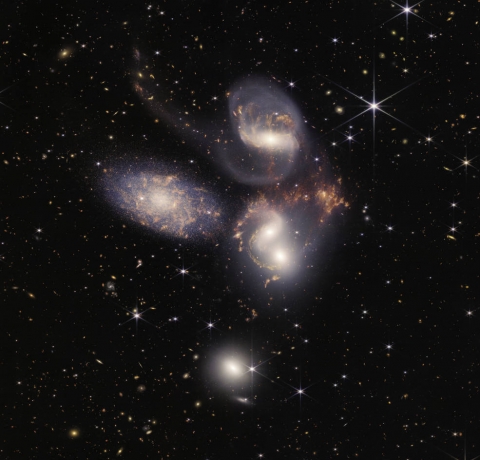Astronomers are excited about the James Webb Space Telescope. “The Webb in its first five days already made discoveries that people have been waiting three decades for,” says Ori Fox PhD, an Instrument Scientist at the Space Telescope Science Institute in Baltimore, MD.
Fox says astronomers expect a few big answers from the Webb, which uses infrared and is the largest optical telescope in space. One discovery from the Webb would be the very first stars and galaxies that have ever formed. “It’s mind-boggling how good this telescope is,” he says. “We’re going to continue finding younger and younger galaxies” which can lead to “a galaxy that was born at the very beginning of time. That’s ultimately what we’re going to see.”

The landscape of "mountains" and "valleys" is speckled with glittering stars is actually the edge of a
nearby, young, star-forming, region called NGC 3324 in the Carina Nebula.
Captured by NASA's James Webb Space Telescope, this image reveals previously invisible
areas of star birth for the first time.
(Courtesy: NASA)
That will inform us about the infancy of our universe. “That’s going to be one really incredible discovery,” Fox says. If we want to understand how the universe got to its present point, he explains, “we need to understand how stars are born and how stars die.”
Astronomy “is about asking questions about the world we live in,” Fox says. “With the will, the cooperation, the time and money, and dedication, you can build the instruments that you need to answer those questions.”
The Webb took many years to design, adjust and construct under the direction of NASA, at a cost of $10 billion.

NASA's James Webb Space Telescope has produced the deepest and sharpest infrared
image of the distant universe to date. This image of galaxy cluster SMACS 0723 covers
a patch of sky approximately the size of a grain of sand held at arm's length by someone
on the ground.
(Courtesy: NASA)
Instrument Scientists at the Space Telescope Science Institute (STSCI) define the observations the telescope instruments need to make, how the data will be obtained, how data will be processed and distributed to the community for analysis. “We have specialists and all the different modes – all the software and all the hardware – and make sure that all works together,” he says.

ARCS Alumnus Ori Fox, PhD, is an Instrument Scientist at the Space Telescope Science Institute (STSCI) in
Baltimore, MD. Fox and his team are working on designing how datasets coming from
NASA's James Webb Space Telescope could be used to further space research.
(Courtesy: Ori Fox)
Fox and his team worked on designing how datasets coming from the Webb could be used, which is not easy when there are 617 different data modes, Fox explains. “Every data mode represents a dataset that has a different file format, display requirements and analysis requirements.”
In the progression of studying the universe, the Hubble Space Telescope came before the Webb, and STSCI is now helping NASA with the Roman Telescope, expected to launch in late 2026.
Fox was an ARCS scholar at University of Virginia in 2007.
“I don’t think I would be where I am today without the ARCS scholarship (scholar award). Because grad school is a tough six years,” Fox says. His wife is an ARCS member in the Metro Washington chapter, so he attends ARCS events.
ARCS is unique, Fox says, because members “come to your institution to see the research that you do, and not just giving you money, but celebrating your research.”
ARCS events “showcase your research not just to other scientists, but to donors, philanthropists, and other people in the community. It’s inspirational on both sides. ”
Would Fox consider going into space? “I have a 5-year-old daughter and I told her that I’m pretty sure one day we’re going to be able to go on a ride together, and I would look forward to that,” he says. Although not as adventurous now, “Would I would go to the moon or in orbit? Yes,” he says.

